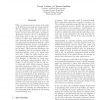Free Online Productivity Tools
i2Speak
i2Symbol
i2OCR
iTex2Img
iWeb2Print
iWeb2Shot
i2Type
iPdf2Split
iPdf2Merge
i2Bopomofo
i2Arabic
i2Style
i2Image
i2PDF
iLatex2Rtf
Sci2ools
SIGECOM
2003
ACM
2003
ACM
Automated mechanism design for a self-interested designer
Often, an outcome must be chosen on the basis of the preferences reported by a group of agents. The key difficulty is that the agents may report their preferences insincerely to make the chosen outcome more favorable to themselves. Mechanism design is the art of designing the rules of the game so that the agents are motivated to report their preferences truthfully, and a desirable outcome is chosen. In a recently emerging approach proposed in UAI-02—called automated mechanism design—a mechanism is computed for the preference aggregation setting at hand. This has several advantages, but the downside is that the mechanism design optimization problem needs to be solved anew each time. Unlike the earlier work on automated mechanism design that studied a benevolent designer, in this paper we study automated mechanism design problems where the designer is self-interested. In this case, the center cares only about which outcome is chosen and what payments are made to it. The reason that ...
| Added | 05 Jul 2010 |
| Updated | 05 Jul 2010 |
| Type | Conference |
| Year | 2003 |
| Where | SIGECOM |
| Authors | Vincent Conitzer, Tuomas Sandholm |
Comments (0)

